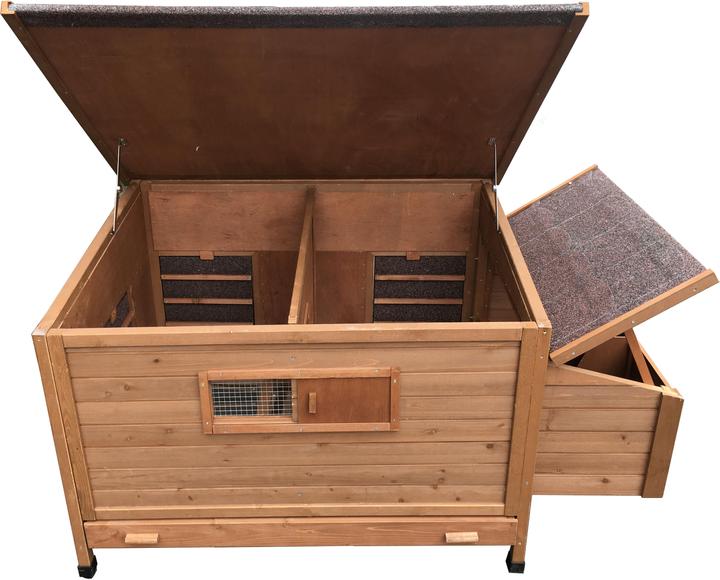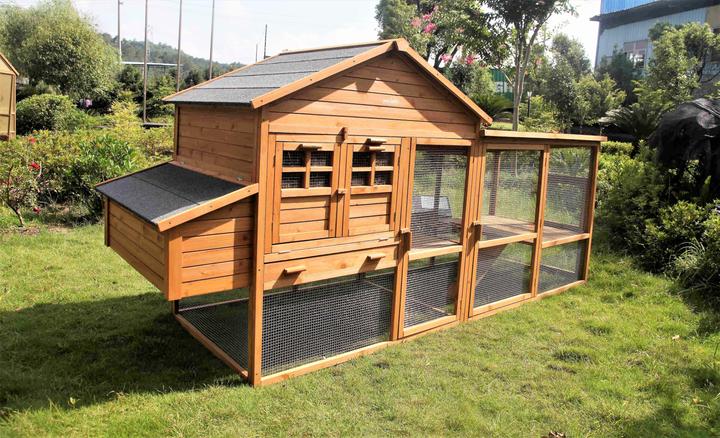

Chickens in the garden - collect your own eggs
Do you attach great importance to quality, especially when it comes to breakfast eggs? Do you always look at origin, rearing and hygiene? Or don't trust local retailers? The solution: have your own henhouse.
Peaceful cackling in your garden? Anyone who thinks that hens are only found on farms is completely off the mark. Many private individuals now keep their own hens too. All you have to do is follow the rules and provide a hen-friendly home. In this article, I show you what you need to consider and what you need to be able to produce your own eggs.
A little history
They are native to Southeast Asia. The wild Burmese hen is considered to be the ancestor of our domestic chickens. In general, hens have a strong sense of smell, but cannot see very well, making them almost helpless in the dark. Chickens therefore live like humans: they wake up at dawn and go home when the sun goes down. In the morning, they go in search of food, around midday they take care of their feathers, and then go back out to look for food. They establish a hierarchy and always use their position of strength - even very brutally if necessary.

Hens are "in"
Among pets, there are more and more chickens. People don't just have them for the perfect eggs for breakfast. While the trend has long been established in the United States and England, it is also attracting increasing interest in Switzerland. These days, everyone is trying to stand out from the crowd however they can - cats and dogs are too boring and normal for that. And: chickens cover many needs and booms simultaneously - from DIY projects for building the henhouse, to growing your own food, to raising pets unlike any other, all areas are covered.
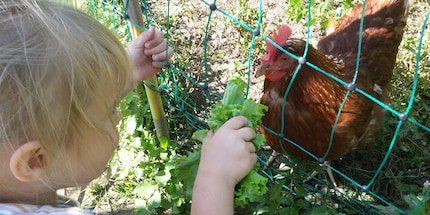
Why chickens?
Experts believe that contact between humans and animals is becoming ever more important, especially in urban areas where green spaces are gradually disappearing. In relation to the trends mentioned above, it seems obvious that chickens are the most suitable. Chickens are also one of the many therapies on offer for restless children. They're the perfect pets: affectionate, simple, don't need much space, eat leftovers and are fairly quiet. Of course, if you also have a cockerel in the henhouse, you can forget about the last point. They are also - even if they don't look it - soft, fluffy and their cackling can have a soothing effect.
It's not as simple as that
What people often forget is that hens also need regular feed and a clean coop. They also need plenty of space: the law prescribes six hens per square metre, although a maximum of two is recommended. They should also have at least 30 to 50 square metres of greenery available - the more, the better. A subdivision would also be ideal for the lawn, so that the torn-up grass can grow again while the hens attack another patch of grass. By tackling, I mean scratching, because they scratch the ground.
Lodging and shelter
In the henhouse, to make the feathered bipeds feel comfortable, it is advisable to put perches high up. Nests for laying eggs are also essential. This is the only way to get eggs for breakfast. After all, you don't want to inadvertently step on them and have to clean up what's left. You also need to think about providing enough water and feed. Chickens shouldn't have to fight to eat. As well as seeds and vegetable peelings, you should also give them small pebbles. Yes, you read that right: pebbles. Chickens need them to digest the seeds and assimilate the limestone for the eggshells. Of course, the pebbles must be small to prevent the hens from choking.
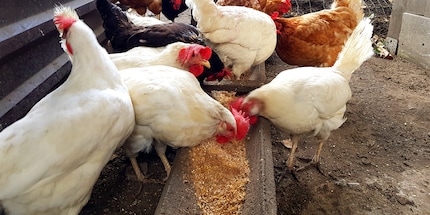
Bad image, good animal
In recent years, chicken meat has lost value, going from one of the most expensive foods to a cheap product. This is mainly due to mass farming, which has been accompanied by increasing demand. And yet, chickens are also very popular as pets. Maybe that's why: to try and combat intensive farming - even if it's only a small contribution. But it feels good, even if you can only offer a better city and a more welcoming home to three or four hens. They thank you with healthy, delicious eggs. They're entertaining too: there's never a dull moment in a henhouse, there's always something to observe.
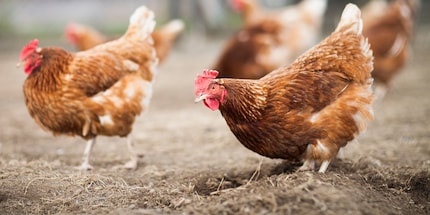
In the heart or in the pan?
Once the hens stop laying eggs, there are two options. You keep them, look after them and care for them as if they were just another pet. Or you slaughter them to eat or sell their meat. Even if the second option seems very brutal and insensitive, it's still a possibility. But most private chicken owners are unable to do this or ask anyone to do it for them. They are attached to these animals - just as you would be with a dog or a cat. With the exception that you can't eat their meat.
It can't get any better
The eggs couldn't be fresher, as they come straight from the "source". 100 per cent organic and, if you go to the trouble and follow the rules, your hens will be just as happy. And you can feel the difference - with every egg you eat for breakfast. Raising chickens properly also requires a quiet environment, because chickens don't like noise. When the weather is bad, they need somewhere warm and sheltered. This will also protect them from predators at night. It's up to you to choose the breed: the Leghorn even lays eggs in winter. There are also those that lay eggs with green shells (in German), breeds that are larger or smaller, more active and calmer. We advise you to ask a hen seller or farmer for information.
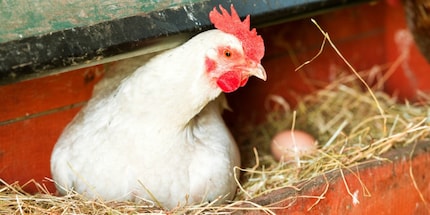
Life is better with two
If you decide to set up a henhouse in your home, to start with you should take at least two hens. You can, of course, take more - the main thing is that the animals have enough space inside and outside the henhouse. Really think about this when you decide on the number of hens. The animals should also know each other from the start, unless you're bringing together different breeds or animals from different sellers to place them together in the new area, or if you're choosing hens that have lived together before. You can always add a cockerel, that's not a problem. But hens that don't know each other can get into brutal fights. You'll be doing them a favour by providing them with a sort of sandbox - they can use it to look after their feathers. A little tidbit that doesn't hurt anyone: hens don't need a rooster to lay eggs, but they do need one if you want chicks.
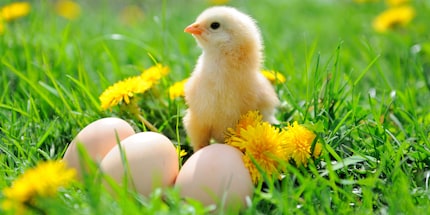
A time-consuming hobby
Although chickens are relatively self-sufficient, before you buy one you should ask yourself if you really have the time and inclination to look after them. If your heart isn't in it and you want to keep your hens, you're not really doing them a favour. You have to take the time every day to collect the eggs, clean the henhouse and feed them. If you have hens as pets and not just for breeding, their affectionate nature also needs your affection. If you don't enjoy them, you've got a garden full of hens and a huge coop or pen to get rid of. As I said, you can shoot them. You can resell the coop. By the way: you can also hire out chickens. So you can see if you can imagine yourself with your own and if it's not just a fad.

What does the law say?
Since 1 June 2010, it has been compulsory to declare poultry farming, even if it is just a hobby. The aim is to ensure proper husbandry, healthy animals, effective control of animal diseases and full traceability of foodstuffs of animal origin. The slope of the enclosure must not exceed 12% and droppings must be removed from walkable surfaces. At least 20% of the surface of the henhouse must be covered with litter. In all cases, it is advisable to discuss the matter with your neighbours beforehand. Although it is not necessary to obtain official authorisation, neighbourly quarrels can be avoided in this way. If you don't put a cockerel in the henhouse, you won't have any noise problems. However, if you do put one in, you should first ask your neighbours for permission. Then there will be no obstacle to your own egg production.
Galaxus for the chicken coop
When I'm not stuffing my face with sweets, you'll catch me running around in the gym hall. I’m a passionate floorball player and coach. On rainy days, I tinker with my homebuilt PCs, robots or other gadgets. Music is always my trusted companion. I also enjoy tackling hilly terrain on my road bike and criss-crossing the country on my cross-country skis.
Practical solutions for everyday problems with technology, household hacks and much more.
Show all